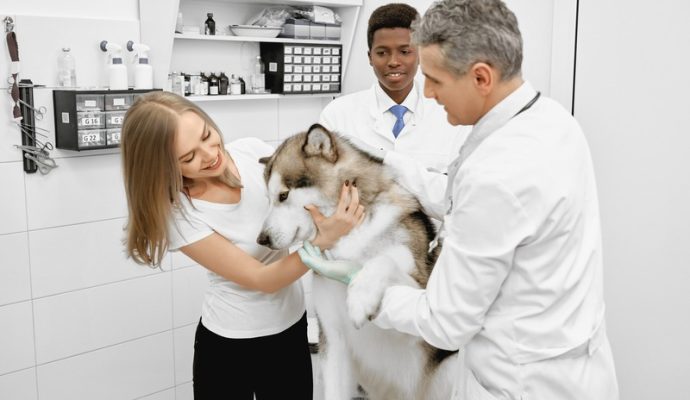When our furry friends get sick, we often scramble for the best possible care, leaving no stone unturned to ensure they return to their playful selves. Radioactive iodine therapy stands out among the various treatments available, especially when managing pet thyroid-related issues. In this article, we’re going to break down what radioactive iodine therapy is, why it’s so critical for pets’ well-being, and how it’s revolutionizing the treatment of thyroid diseases in animals.
What Are Thyroid Issues in Pets
Before diving into the specifics of radioactive iodine therapy, let’s examine why thyroid health is vital in pets. The thyroid gland is a small but mighty organ that regulates metabolism, energy levels, and overall health. In pets, just as in humans, the proper functioning of this gland is crucial. However, when things go awry, pets can suffer from either hypothyroidism or hyperthyroidism, though the latter, a condition characterized by an overactive thyroid, is more common, particularly in cats.
Hyperthyroidism and Its Impacts on Pets
Hyperthyroidism can make a pet’s life quite difficult. Symptoms often include excessive eating, weight loss, hyperactivity, and, in some cases, aggression. If left untreated, it can lead to severe heart problems and, ultimately, a diminished quality of life. This is where radioactive iodine therapy, known as iodine treatment for cats and dogs, steps in as a game-changer.
Radioactive Iodine Therapy Explained
What is Radioactive Iodine Therapy?
Radioactive iodine therapy is a sophisticated treatment that specifically targets thyroid issues with minimal side effects. It involves a simple process where the pet is given a small dose of radioactive iodine, either orally or through an injection. This iodine naturally targets the overactive thyroid cells, effectively destroying them and returning the thyroid function to normal levels.
Why it’s a Preferred Option
-
Safety: The therapy is extremely safe, with most pets experiencing no significant side effects.
-
Efficiency: It’s remarkably effective, with a success rate of over 95% in curing hyperthyroidism.
-
Non-invasive: Unlike surgery, it doesn’t require anesthesia or an invasive procedure, which is always a plus, especially for senior pets or those with other health issues.
-
Minimal Stress: It’s less stressful for pets and pet owners, as it usually involves a one-time treatment without lifelong medication.
Moreover, before considering radioactive iodine therapy, a thorough assessment by a veterinary diagnostic lab is crucial. These labs perform comprehensive tests to ensure that your pet is suitable for the treatment, considering factors like kidney function and overall health. This step is paramount to tailoring the treatment to your pet’s specific condition and needs.
Preparing Your Pet for the Therapy
After deciding that radioactive iodine therapy is the right course of action, there are a few steps to prepare your pet for the treatment. Firstly, they’ll need to be weaned off any thyroid medications they’re on, typically for a few weeks. This ensures that the radioactive iodine will be fully adequate. Secondly, a special low-iodine diet may be recommended to improve treatment outcomes further.
Advanced Diagnostics and Treatment Facilities
Thankfully, advancements in veterinary medicine have made diagnosing and treating hyperthyroidism in pets easier. For example, a dog CT scan in Springfield, VA, is an excellent tool for diagnosing various conditions, including thyroid issues, providing detailed images to help pinpoint the problem areas. Similarly, specialized facilities equipped to administer radioactive iodine therapy safely are becoming more widespread, ensuring that pets receive the best care possible.
Learning from Success Stories
We’ve seen countless success stories of pets who’ve gone from lazy and sick to vibrant and healthy post-radioactive iodine therapy. These stories highlight the therapy’s effectiveness and its ability to improve the quality of life for our furry companions drastically.
How the Therapy Changes Lives
-
Pets often show a remarkable improvement in energy levels and overall behavior.
-
Weight stabilization is common, with pets returning to a healthy weight post-treatment.
-
Many pets can lead a medication-free life after therapy, free from the daily stress of pills and treatments.
Final Thoughts
In conclusion, radioactive iodine therapy represents a significant leap forward in treating thyroid issues in pets. Its safety, efficiency, and minimal invasiveness make it a preferred option for many pet owners and veterinarians alike. By effectively targeting the problem at its source, it offers a real chance at a healthier, happier life for pets suffering from thyroid conditions.
With the help of early diagnosis through advanced tools like veterinary diagnostic labs and CT scans, coupled with cutting-edge treatments such as iodine treatment, our pets stand a much better chance of returning from thyroid problems. So, if your furry friend is showing signs of thyroid issues, it’s worth exploring whether radioactive iodine therapy could be the right option for them.




